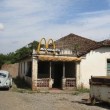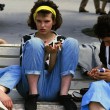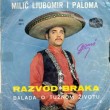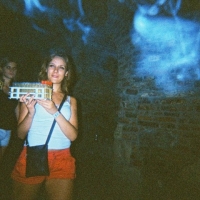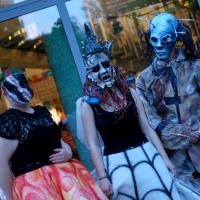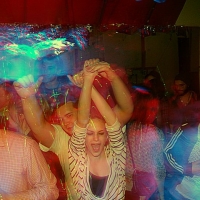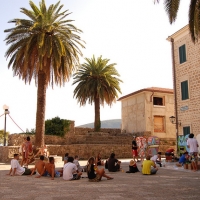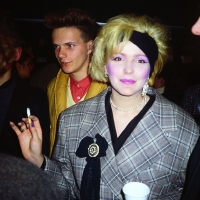What happens when a poster for a theatre play is accidentally placed next to an image of politician running for mayor?
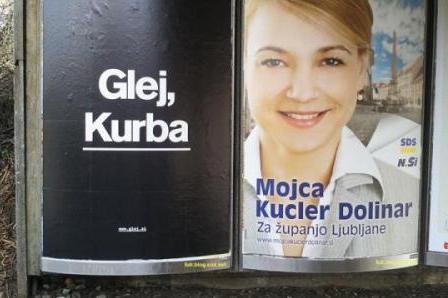
The "Look, Whore" poster next to the image of New Slovenia - Christian Democratic Party candidate for mayor of Ljubljana
Art should criticize and reflect, art should create new pathways for thinking and generate ideas for questions that should be asked… or not? Can one cross the line with the limits of freedom of speech, or is this line only a bendable thread? How far should political policing be allowed to go and can the roles actually be reversed: can art put politics in its place?
The Glej Theatre, which for over four decades has been one of Ljubljana’s most innovative, creative, and experimental theatres, has proved yet again that it is worthy of its eminent reputation. This time it wasn’t a particular play that placed Glej in the spotlight, but a poster for a fresh monodrama – Kurba, or ‘Whore’. The theatre was at the center of a small public uproar when the play’s promo poster was placed next to a poster of the New Slovenia-Christian Democratic Party’s candidate for mayor of Ljubljana. New Slovenia “intervened” with the company which had mounted the poster, and it was removed in an hour. In a matter of minutes, conservative and tabloid media outlets began decrying the “abject provocation” of the “lefties”. The party not only went to work reinterpreting the poster for the upcoming monodrama, but also had it put on trial before it had even premiered.
To clarify, Glej means ‘look’. While posters for Kurba have three different slogans (including the name of the author and the title) the poster that was placed next to that of mayoral candidate Mojca Kucler Dolinar read Glej, Kurba which translates as “Look, Whore”.
The play is a dramatization of columns that the notoriously upfront and outspoken Croatian writer Vedrana Rudan wrote for the Nacional weekly. The collection of these columns were first published in Slovenia as a book, under the title When a woman is a whore/When a man is a faggot. Speaking from a rather unique feminist position, these texts interact with themes such as political corruption, abortion, the Catholic church, social conditions in post-communist societies, conservative upbringings, pedophilia, sexual abuse and many more.
Kurba is directed by Marko Bulc, well known for his success with the monodrama Ćefurji Raus, and who has also been the creative director of the theatre since 2010. The play’s critical observations and black humour are embraced and articulated by Violeta Tomič, a celebrated actress in Slovenia.
So despite the fact that the play hadn’t even premiered at the time of this incident, one could say that it was not the content of the play itself that offended the New Slovenia party, but the fact that it was placed – by the company responsible for mounting posters – beside their candidate, creating a comical, seemingly inappropriate situation.

Actress Violeta Tomic, writer Vedrana Rudan and director Marko Bulc taking bows after the pre-premiere
Is it really so obvious that such posters shouldn’t appear next to each other? Should such an accidental situation really be taken so seriously that the Party’s PR machine had to be deployed?
Here’s how one could look at it: New Slovenia’s reaction can also be interpreted in terms of the governing coalition’s official position towards arts and culture. Namely, it’s continuation of the ongoing attack on arts and culture that deepened with the advent of the new right wing coalition, which ended the existence of Slovenia’s Ministry of Culture after the last general elections.
But let’s try another perspective. We can only wonder what caused such upheaval: the themes of the play, the word “whore” on the poster, the poster’s placement next to the conservative politician’s poster (accidentally or on purpose), and whether or not the pre-premier of the play on the the day of elections was coincidental? Of course, some right-wingers called it a conspiracy. But wasn’t the reaction to the poster also a conspiracy of sorts?
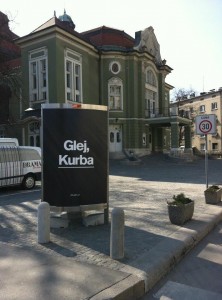 It wasn’t only the mayoral elections that were important that week. In Slovenia, March 25th, 2012 witnessed not only the pre-premiere of Kurba in Glej and the elections for mayor of Ljubljana, but a national referendum on the new Family Code which had been passed only a few months ago by the then-governing left wing coalition. The new Family Code expands the rights of existing same-sex registered partnerships and treats them equally to married opposite-sex couples, except in terms of adoption. The referendum was to decide whether or not the Family Code had popular support.
It wasn’t only the mayoral elections that were important that week. In Slovenia, March 25th, 2012 witnessed not only the pre-premiere of Kurba in Glej and the elections for mayor of Ljubljana, but a national referendum on the new Family Code which had been passed only a few months ago by the then-governing left wing coalition. The new Family Code expands the rights of existing same-sex registered partnerships and treats them equally to married opposite-sex couples, except in terms of adoption. The referendum was to decide whether or not the Family Code had popular support.
Could the fuss about the Whore poster be a PR tactic aimed at motivating undecided or lazy right-wing supporters to go to the polls on a sunny day? Couldn’t the Whore poster affair then be interpreted as a conspiratorial call to voters to mobilize against the progressive legislation advancing the rights of the LGBT population?
In the end, New Slovenia’s candidate was defeated in the mayoral elections by a landslide, but on the same day, the new Family Code was buried by referendum, with 55% voting against it and 45% in favor of it, with a 30% voter turnout.
Surely, one can imagine more radical juxtapositions with the Look, Whore poster than this one. While every interest group has the right to complain and use its PR to influence the media, we do question whether such complaints are responded to so quickly when minority interest groups express them. Would the response be as decisive if a Look, Deviant poster was placed next to a poster of a lesbian candidate for mayor?


